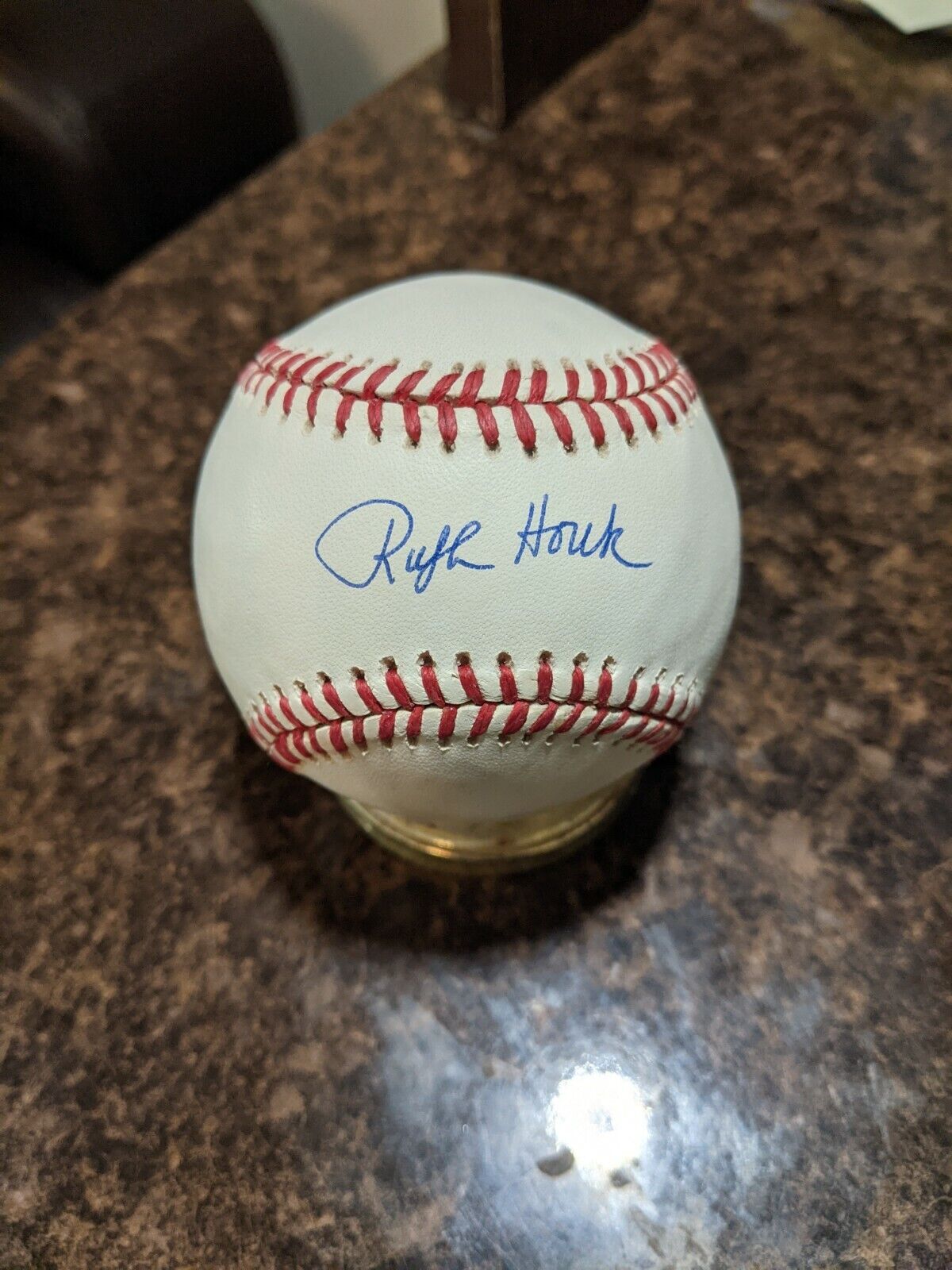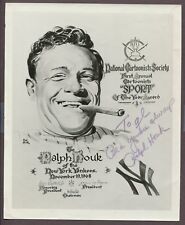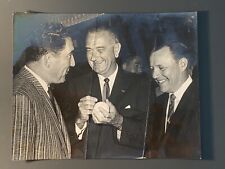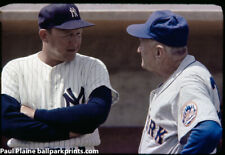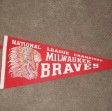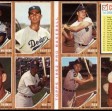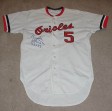When you click on links to various merchants on this site and make a purchase, this can result in this site earning a commission. Affiliate programs and affiliations include, but are not limited to, the eBay Partner Network.
RALPH HOUK ROML SIGNED AUTOGRAPHED BASEBALL COMES WITH BECKETT COA NUMBERED STICKER AFFIXED TO BALL ALSO COMES WITH BECKETT MATCHING NUMBERED COA CARD SEE PICS SNOW WHITE.SEE PICS FOR CONDITION OF BALL i\'M VERY COMPREHENSIVE IN CLOSE UP OF ALL PANELS. YOU WILL RECEIVE EXACT BALL PICTURED NO TONING OR YELLOWING OR SPOTSBECKETT#C15736 COMES WITH DISPLAY BALL CUBE TOO.
A native ofLawrence, Kansas(Stull Community), Houk was a catcher working his way through the Yankees\'farm systemwhen the U.S. entered World War II. He enlisted in the armed forces, serving with Company I, 89th Cavalry Reconnaissance Squadron (Mechanized) of the 9th Armored Division in July 1944.[1]He rose to the rank of Major (the source of his Yankees nickname). He was a combat veteran ofBastogneand theBattle of the Bulge, and was awarded theSilver Starwith an Oak Leaf Cluster, theBronze Starwith an Oak Leaf Cluster andPurple Heart.[2][3]
Coaching career[edit]
During his last five years as a major-league player (1950–1954), Houk played in only 31 regular-season games, made 30 totalplate appearances, and caught 83innings.[4]By 1953 he had transitioned to becoming the Yankees\' full-time bullpen coach, effectively beginning his managerial apprenticeship.
In 1955 he was named manager of the Yanks\'Triple-Aaffiliate, theDenver Bearsof theAmerican Association. Following three highly successful seasons at Denver, culminating with the 1957 league playoff andJunior World Serieschampionships, Houk returned to the Bronx as Stengel\'s first-base coach from 1958 to 1960. From late May through early June1960, Houk served as acting manager of the Yanks for 13 games while Stengel, 70, was sidelined by illness. (The team won 7 and lost 6.) Then, after the Yanks lost the1960 World Seriesto thePittsburgh Pirates—and with Houk one of the hottest managerial candidates in baseball—the Yankees \"discharged\" Stengel (to use Stengel\'s own words) and promoted Houk.
A player\'s manager[edit]
Houk was known as a \"player\'s manager\"—albeit one with a quick temper. FutureLos Angeles DodgersmanagerTommy Lasordabriefly played for Houk at Denver and called Houk the best handler of men he ever played for, and modeled his managerial style on him.[5]TheKansas Sports Hall of Fame, of which Houk is a member, describes Houk as \"rough, blunt and decisive\" and his tantrums in arguments withumpiresearned him 45 ejections as a manager in the majors. Houk is tied withBilly Martinfor fourteenth place on baseball\'s \"most ejected\" list.[6]
The early 1960s Yankees responded to Houk\'s leadership; the 1961 team led byRoger Maris(61home runs),Mickey Mantle(54 homers) andWhitey Ford(25 victories) won 109 games and beat theCincinnati Redsin five games in theWorld Series. His1962club won 96 games, and were victorious over theSan Francisco Giantsin seven games in theFall Classic. In1963, the Yanks won 104 games and rolled to the pennant, but were swept in four games by the Dodgers in theSeries.
In the Yankees front office[edit]
Houk moved into the Yankees\' front office asgeneral manageron October 23, 1963,[7]replacingRoy Hamey, and Berra, at the end of his playing career, became the Yanks\' new manager. Yogi would win the1964pennant after a summer-long struggle with theBaltimore OriolesandChicago White Sox, but Houk and the Yankee ownership quickly became disenchanted with Berra\'s work and in late August they made up their mind to fire him regardless of how the season turned out. After the Yankees\' seven-game loss to theSt. Louis Cardinalsin the1964 World Series, Houk sacked Berra. Later, Houk said that the Yankee brain trust had concluded Berra wasn\'t ready to be a manager, though he didn\'t elaborate on the reasoning.[8]
To succeed Berra, he then hiredJohnny Keane, who had just resigned as manager of the champion Cardinals. Houk had admired Keane as a competitor in the American Association from almost a decade before and, according to authorDavid Halberstam, the Yankees had made overtures to Keane during the 1964 regular season about becoming their manager for 1965.[9]But the great postwar Yankee dynasty was aged and crumbling, the farm system had seriously deteriorated, and theKansas City Athleticswere no longer a reliable source for Major League talent. Keane, a longtime minor league manager, was better suited by temperament for managing young players than established and aging superstars, and his hiring was a failure. The team fell to sixth in1965—their first losing record since 1925, and only their second since 1918. When they won only four of the first 20 games of1966, Houk fired Keane on May 7 and named himself manager, assuming that job for the second time.
Back to the bench[edit]Houk (at front, in Yankees uniform) withRichard Nixonon April 7, 1969Second term with Yankees[edit]
Houk (eventually succeeded as general manager byLee MacPhail) thus began a second, and far less successful, term as Yankee manager, finishing the 1966 season. Their talent and farm system both depleted, the Yankees finished in last place for the first time since1912. A long rebuilding process followed, includingBobby Richardson\'s retirement (Richardson\'s roommate,Tony Kubek, had retired because a bad back after the 1965 season) and the trading away of Maris,Clete Boyerand, during the 1967 season,Elston Howard.
Houk would continue to manage the Yankees from 1967 until 1973. His best season was1970, when the Yanks won 93games, but finished 15 games behind the eventual World Series championBaltimore Orioles. He worked forGeorge Steinbrennerfor one season, in1973, and was the Bombers\' manager during their final game in 1973 at the \"original\"Yankee Stadiumprior to its closure for two years for renovation.
After the final game of 1973, he resigned as manager. While Steinbrenner\'s commanding style has led some to think the new owner influenced Houk\'s departure, he told Bill Madden of theNew York Daily Newsit was the constant booing of Yankee fans that pushed him. Houk even said that Steinbrenner insisted he\'d get some new players to restore the team\'s greatness. \"And he did, bringing inCatfishandReggie, \" Houk told Madden in the sportswriter\'s bookPride of October.\"That\'ll make you good in a hurry!\" Apart from a brief stint with theDetroit Tigers\' Class B affiliate inAugusta, Georgia; he had spent the first 35 years of his adult life on the Yankees\' payroll.
Detroit Tigers[edit]
On October 11, 1973—less than two weeks after Houk left the Yankee organization—he became the manager of the rebuildingDetroit Tigers. The veteran club (its1973roster averaged 31.8 years of age[10]) had won theAL Eastin 1972 underBilly Martin, but was in need of replacing its longtime stars, including Hall of FamerAl Kaline, with younger talent. The low point came in1975, when Houk\'s team lost 102games, but the1976Tigers improved their record by 14 games behind the heroics of rookie pitcherMark Fidrych, who won 19 games while becoming a national sensation. By1978, Houk had restored Detroit to respectability and its first winning record since 1973, bringing to the team future stars of theSparky AndersonTigers such asLou Whitaker,Alan TrammellandJack Morris. After an 86–76 season in 1978, and with the roster\'s average age a youthful 26.3,[11]Houk retired.
Boston Red Sox[edit]
His final record, over 20 years with the Yankees (1961–1963, 1966–1973), Tigers (1974–1978) and Red Sox (1981–1984) was 1,619wins and 1,531 losses (.514), plus eight wins and eight losses in the World Series. After his first three championship seasons, he never appeared in the postseason.[12]
Late career[edit]
Houk served with theMinnesota Twinsas a special assistant to general managerAndy MacPhail, Lee\'s son, from 1987–1989 before retiring from the game for good.[7]He thus enjoyed one additional world championship season, when the Twins defeated the Cardinals in the1987 World Series.
Houk was portrayed byBruce McGillin the 2001 film61*.
He died on July 21, 2010 inWinter Haven, Florida, just nineteen days before he would have turned 91. At age 90 he was, at the time, the oldest living manager of a World Series-winning, pennant-winning or post-season team. He was survived by a daughter, Donna; a son, Robert; four grandchildren and 10 great-grandchildren.
On July 22 the Yankees announced players and coaches would wear a black armband in Houk\'s memory on the left sleeve of their home and away uniforms for


